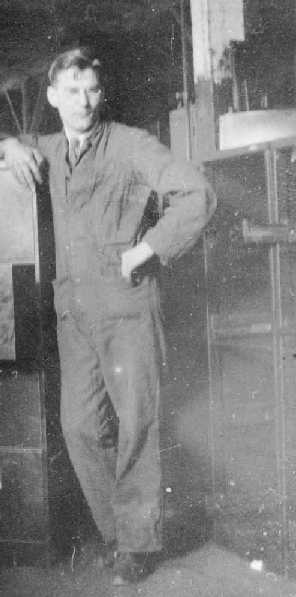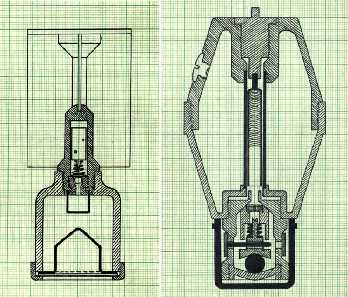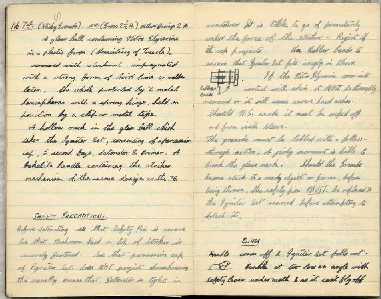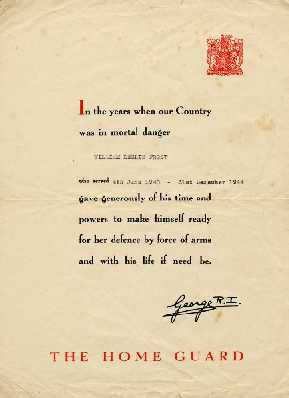 This
wonderful memoir was recorded on tape by William Leslie
Frost (1913-1984) shortly before he died. He is pictured
left in the early 1940s when he was working at Joseph Sankey
& Co. Ltd. as a draughtsman. The memoir
describes his service in a Shropshire Home Guard unit between
1940 and 1944 which he undertook in addition to his responsibilities
as a designer working on Spitfire fuselage construction.
It was transcribed and edited by his son, Allan J. Frost,
and was first published in the Wellington News in November
2005.
This
wonderful memoir was recorded on tape by William Leslie
Frost (1913-1984) shortly before he died. He is pictured
left in the early 1940s when he was working at Joseph Sankey
& Co. Ltd. as a draughtsman. The memoir
describes his service in a Shropshire Home Guard unit between
1940 and 1944 which he undertook in addition to his responsibilities
as a designer working on Spitfire fuselage construction.
It was transcribed and edited by his son, Allan J. Frost,
and was first published in the Wellington News in November
2005.
(We
are deeply indebted to Allan Frost for allowing us to reproduce
this memoir and its accompanying illustrations on this website.
Mr. Frost is a well known historian specialising in the
history of Wellington, Shropshire, and has a number of fascinating
books to his credit. Please click
here for information on these and full contact details
for the author.)
LESLIE
FROST AND THE WAR YEARS
During the war I was in
what you'd call a reserved occupation at
Sankey's in
Hadley.
They didn't look kindly to anybody disappearing at that
time if they'd got any experience, particularly in the engineering
world. They didn't take kindly to people volunteering and
clearing off and, as it happened, I got stuck on Spitfire
fuselage assemblies, I was responsible for the drawing office
ends of things if the drawings came from Vickers headquarters
at Castle Bromwich, the Spitfire headquarters: management
at Sankeys sent the drawings through to me for amendment.
It was my job and responsibility to see that Vickers got
the latest drawings. If any alterations or repairs were
wanted to be effected during the assembly of these things,
then I used to have to make the drawings out for them and
apply for the concession to be made so they could be passed
by their engineers and then passed through to the Air Ministry
inspection department for them to follow up as well, so
everybody had records of them. It was amazing the number
of times that repairs were needed! And sometimes, of course,
there was a problem when air operations were in progress
(something giving way or wanted strengthening) and emergency
operations had to be put in to strengthen where necessary:
these came through to me again to see that whatever necessary
was carried through.
And that was more or less
what I was on all the time during the war. Which meant considerable
alteration down at Sankey's itself because access to the
works was only down one narrow lane and over two railways
so that personnel had to walk down under two bridges but
materials and stuff had to come to come to the firm over
the top of the railways and over level crossings. Then down
to the front of the factory, which had only got a comparatively
narrow entrance. The material for the fuselages and the
framework, etc., had to be transported halfway across the
works to the far end of the factory. So that's how the main
entrance later came into being from the
Leegomery end. A
new road was put through to it and it certainly made it
far easier to facilitate the in and out of materials and
made a big difference to the firm itself as it started expanding:
production was wanted and production was needed. In addition
to the Spitfires there were the spinner cones for Wellington
bombers. We did one or two wings for Wellingtons as well,
but the Spitfire was the main concern and at one stage we
were getting around 3 or 4 fuselages a day out, complete
with engine, and shipping them off to Castle Bromwich.
Well, when the invasion
scare came in 1940, well before it actually happened, the
government decided to form Local Defence Volunteers to help
to patrol and watch for any of the parachutists being dropped
over here, as spies I suppose: you never knew whether you
were being told truth or lies during the war. The first
casualty of war is truth. We had no weapons; it was after
Dunkirk when the big evacuation came through and the blitz
had started. There wasn't enough weaponry to go round the
existing forces let alone anybody else, so people were wandering
round the countryside looking and ducking and vanishing.
That's what LDV stood for, 'Look, Duck and Vanish': you
were told to do that because you'd got nothing to do anything
else with!
The idea was to report anything
unusual and we went wandering round the countryside on bikes:
one big advantage was that you could go anywhere on anybody's
land and you couldn't be stopped. There was no question
of anybody trespassing or anything like that. You had the
right to go wherever you fancied. Certain areas were mapped
out as routes, so you patrolled these areas and used these
routes but there's more than one (not in my case, I might
say!) person's cabbages and beans had disappeared out of
the various gardens up and down the country which were not
the result of enemy action. But taking it by and large,
the system worked reasonably well until munitions supplies
started to come from Canada and America. When the position
improved, the Government decided to run us on a more military
basis and formed the Home Guard in proper army units. We
were affiliated to the Regular army units of the KSLI (King's
Shropshire Light Infantry) and we were in the 5th Battalion.
We belonged to "D" Company whose headquarters
were up at Wrekin College. One of the masters at the Wrekin
College with the same surname as myself, Frost,
was the company commander but my platoon was based at Blockley's
Brick Works at Hadley, under my old boss Mr.
Shaw.
Mr. Shaw was an old 1914-18
War veteran who'd been to Gallipoli and places like that.
So that's how we formed up and started training. Regular
soldiers came down to shove us through our paces, which
was a very peculiar thing because we had such a mixed bag
of odds in this Hadley platoon. There were people from Leegomery,
farm labourers, older ones of course, who were a bit short-winded.
There were us younger ones who were pretty fit and there
were all shapes and sizes in between. So, when you were
put through your paces, the younger ones were luckier because
they could stand the pace while the older ones couldn't.
And we had to do quite a bit of reading before the people
who came in to instruct us realised the state they were
in.
I seem to have had an eye
for shooting because it wasn't very often I didn't get a
possible top score with a gun on the 200 yard range they
built up at Blockley's clay pits: they dug a trench out
at the back, like at the Wrekin firing range, where the
people manipulated targets and indicated whether the shots
were on target. The targets were under/over ones. I seem
to have kept at it except when I started to wear glasses
and, of course, you cannot focus properly at all with glasses.
I joined just as an ordinary
private but I thought to myself, 'Well, if it ever becomes
necessary and you really are wanted, the more efficient
you are the better.' So I used to get stuck into the exercises
and swatted. You could buy books on things and borrow official
books on grenades.
Eventually, after a year or so, I went to a couple of courses,
one down south and another up near Southport to train as
a weapons training officer. Most of that was to do with
grenades, so at the finish I was quite proficient on those.
We had to do the practical ends of things as well, such
as what you had to do when the bombs didn't go off and had
to destroy them. I became more and more interested in that
side ofthings to be quite honest. I made myself
grenades.
Eventually, after a year or so, I went to a couple of courses,
one down south and another up near Southport to train as
a weapons training officer. Most of that was to do with
grenades, so at the finish I was quite proficient on those.
We had to do the practical ends of things as well, such
as what you had to do when the bombs didn't go off and had
to destroy them. I became more and more interested in that
side ofthings to be quite honest. I made myself some models and thingslike that to demonstrate how these
things worked and, of course, you can't do things like that
without coming to the notice of others. So eventually I
was made a Lance Corporal and then a Corps Sergeant and
ended up as a Second Lieutenant and Training Officer for
the Company. With powers to do all the necessary training,
organise the training, review any new weapons coming through,
all this had to be done by me for the company. And we had
a subsistence allowance of 1/6d
(7.5p) when we went on patrol
and had to stop out most of the night, to provide our refreshments
if we could get them off our rations. We did have a bit
of concession, I suppose, in that we had a bit of tea, free
tea and things like that. That's how it worked out.
some models and thingslike that to demonstrate how these
things worked and, of course, you can't do things like that
without coming to the notice of others. So eventually I
was made a Lance Corporal and then a Corps Sergeant and
ended up as a Second Lieutenant and Training Officer for
the Company. With powers to do all the necessary training,
organise the training, review any new weapons coming through,
all this had to be done by me for the company. And we had
a subsistence allowance of 1/6d
(7.5p) when we went on patrol
and had to stop out most of the night, to provide our refreshments
if we could get them off our rations. We did have a bit
of concession, I suppose, in that we had a bit of tea, free
tea and things like that. That's how it worked out.
We used to stay the night
up at Blockley's works, which was all right during the summer
but when winter came we didn't go out on patrol but had
to stop there to man the communications centre. On one occasion,
when we came to use the teapot, it was full of, er, well,
we'd forgot to empty out the dregs from a month or two before
and there was a lot of penicillin in it which had to be
scalded out! One of the drawbacks was that I lived near
the drill hall in Wellington, so whenever our company was
supposed to be on duty there and didn't turn up (which happened
quite often), I was dug out late at night or in the early
hours to go and stop at the drill hall in the communications
room, at the top of a bunk (with rats scurrying around underneath)
in case phone calls come through. I never had a phone call
but whether they'd come through or not when I was asleep
I don't know!
The arsenal, the
Woolwich
Arsenal, moved up to Donnington. When the workers came up
there were no houses for them and, although we'd got a baby
and my wife's old Mum (we'd plenty to do to look after them)
as we'd got a spare bedroom, we should have one of these
London chappies billeted on us. And he proved to be a very
nice fellow all round, a decent chap, and he did provide
access to black market eggs and things like that from the
local pub where he went to have his drink.
We looked after an evacuee
from Smethwick for a short while; she left when her parents
had to contribute a little to her keep. She was a twelve
year old.
My daughter had been born
in August 1939, just before the War started. My elderly
mother-in-law died in 1942. One of her grandsons came over
with the American Forces (that branch of her family had
emigrated to America thirty-odd years earlier) a few months
later to see her but he could only visit her grave in Wellington
cemetery. My first son was born in 1943. Near the time he
was due to be born, I was encouraged to go on a course down
at Dorking, a Home Guard course on grenades and weapon training,
with a view to becoming a weapon training bloke myself.
I had become very interested in these things and, with typical
military efficiency, I was sent down a day too early, travelling
down with my rifle and equipment and my allocation of the
one or two rounds of ammunition they dare let us have. Because
I was a day early, they didn't know anything about me. I
said, 'Well, you'd better find out something about me because
I want to come and I don't want to stop on the station all
night.' So they sent a little truck to fetch me: it turned
out to be the Lord Lieutenant of the County's place where
this course was being run. Rank went by the board, everybody
was in the big dining hall with the portraits of the Lord
Lieutenant of the County's ancestors round the walls, with
tablecloths, proper cutlery… and tipping everywhere you
went!
It was a very interesting
course, actually. I always remember one moment when it didn't
seem to be such a good idea when the chappie who was taking
us on mines was talking to us and had a mine in front of
him. He was pretty deaf because of the bangs and explosions
he'd  been
through during his operations and training and he kept idly
pressing up and down on top of the mine; fortunately it
was a dummy one but everywhere we went (to a grenade range,
to the firing range, to the bombardier range, the spigot
mortars range, etc.) there was a tip for the driver, another
tip for the driver and so on. I always remember the first
night being there: I ended up in the
stoke hole with a little Irish
been
through during his operations and training and he kept idly
pressing up and down on top of the mine; fortunately it
was a dummy one but everywhere we went (to a grenade range,
to the firing range, to the bombardier range, the spigot
mortars range, etc.) there was a tip for the driver, another
tip for the driver and so on. I always remember the first
night being there: I ended up in the
stoke hole with a little Irish  bod who was three parts slewed
with a bottle of whisky by the side of him. We were sitting
there looking at the stoke hole and what he wouldn't have
done to the Pope if he'd have had him there! He'd have stuffed
him up the stoke hole and all sorts of things! To me it
seemed funny at the time. In view of what happens nowadays
you realise how far back these things go because he wasn't
joking.
bod who was three parts slewed
with a bottle of whisky by the side of him. We were sitting
there looking at the stoke hole and what he wouldn't have
done to the Pope if he'd have had him there! He'd have stuffed
him up the stoke hole and all sorts of things! To me it
seemed funny at the time. In view of what happens nowadays
you realise how far back these things go because he wasn't
joking.
It was a very interesting
time down there. I was most impressed with the full gas
hedge-hopper, which consisted of a forty gallon mixture
of tar and oil and all sorts of things like that with a
charge underneath it; the ideal thing was you waited until
an enemy tank was just the other side of a hedge, and you
blew it up. The idea was that you just tried to hawk it
over the hedge, set it on fire so it smothered the tank
and enveloped it in flame. Unfortunately, (or fortunately
as it went a bit wrong) one had a bit too much charge underneath
it (it was a delicate operation) and it went up in the air
in one big ball of fire about 50 feet across, very impressive!
Another incident on the
range was when we went to throw the anti-tank mines and
lob them over the hedge into the tracks of the tanks. The
mines were in the shape of a Thermos flask. The aim was
to get them close to the tank, not from over a hedge like
we did in practice, because that isn't any protection against
small arms fire or any other fire, but from behind a suitable
wall from where you could lob it. You took the cap off the
mine, a little tape was wound round the handle and round
the fuse, with a lead weight on the end… and you lobbed
it over. However, when I got to the officer after the throwing
part of the proceedings, he looked a bit shaken when he
asked my companion, a little Welshman. 'How did you get
on? 'Oh', says the Welshman. 'Oh, I chucked mine up. The
tape came out and all the rest, but it dropped down at our
feet… and it didn't go off.' 'It didn't go off?! You two
are the luckiest people alive!'
I enjoyed the holiday down
there, and the luxury. A change during the war years. When
I returned home, I was fully expecting to find whatever
it was, a boy or a girl, would have arrived. But he hadn't.
My son was born a week later than expected. I wouldn't have
known if the anti-tank mine had done its job properly!

Postscript
Leslie Frost died in December
1984. A working plywood model of a hand grenade (used in
his Home Guard training sessions) and countless grenade
firing pins were discovered in the attic of his home in
King Street, Wellington, together with his sub-lieutenant's
swagger stick. The attic also contained several rounds of
live rifle ammunition, two hand grenades (defused) and a
smoke bomb (still primed for use). And, of course, his Certificate
of Commendation from H.M. King George VIth.

Allan Frost
1st
January 2006
© Allan J. Frost
2006